Tax Advice Report: Assessing Tax Liabilities for Mr. Mark Lewis
VerifiedAdded on 2022/09/29
|7
|2277
|21
Report
AI Summary
This report provides a comprehensive tax analysis for Mr. Mark Lewis, an Australian resident employed on a cruise ship. The report examines his assessable income, including his salary from the cruise liner, rental income from a farmhouse, and profits from cattle breeding. It considers relevant tax laws, such as the ITAA 1997, double taxation agreements, and ATO rules regarding rental properties and business income. The analysis determines Mr. Lewis's tax liability, emphasizing that his income is taxable in Australia despite working internationally. The report also addresses specific aspects of his income, such as the valuation of livestock in his cattle breeding business, and suggests the application of small business tax rules. It concludes that Mr. Lewis is subject to Australian taxation on his worldwide income, with potential offsets from double taxation agreements, and details the requirements for declaring his various income sources and claiming deductions. This report is a valuable resource for understanding tax obligations and seeking financial advice.
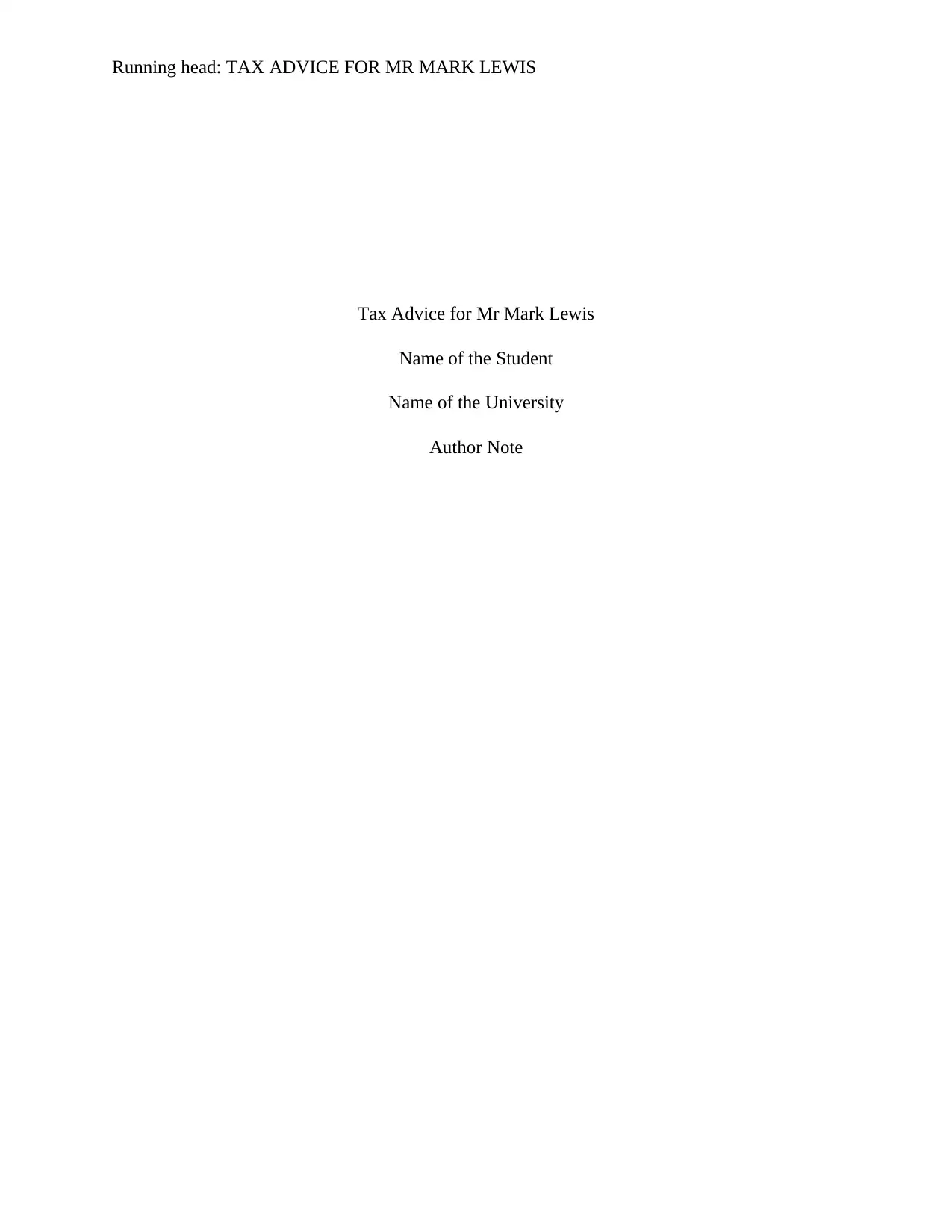
Running head: TAX ADVICE FOR MR MARK LEWIS
Tax Advice for Mr Mark Lewis
Name of the Student
Name of the University
Author Note
Tax Advice for Mr Mark Lewis
Name of the Student
Name of the University
Author Note
Paraphrase This Document
Need a fresh take? Get an instant paraphrase of this document with our AI Paraphraser
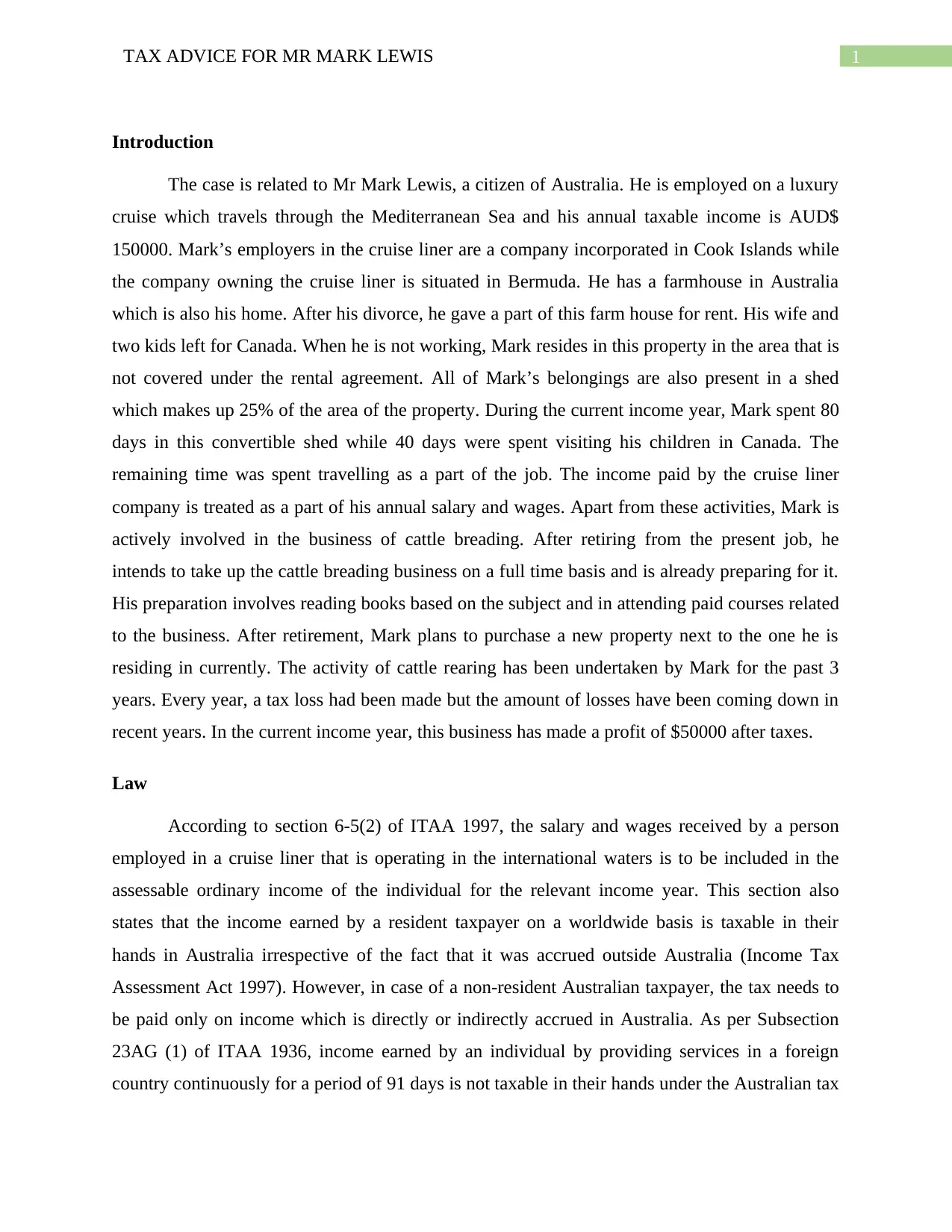
1TAX ADVICE FOR MR MARK LEWIS
Introduction
The case is related to Mr Mark Lewis, a citizen of Australia. He is employed on a luxury
cruise which travels through the Mediterranean Sea and his annual taxable income is AUD$
150000. Mark’s employers in the cruise liner are a company incorporated in Cook Islands while
the company owning the cruise liner is situated in Bermuda. He has a farmhouse in Australia
which is also his home. After his divorce, he gave a part of this farm house for rent. His wife and
two kids left for Canada. When he is not working, Mark resides in this property in the area that is
not covered under the rental agreement. All of Mark’s belongings are also present in a shed
which makes up 25% of the area of the property. During the current income year, Mark spent 80
days in this convertible shed while 40 days were spent visiting his children in Canada. The
remaining time was spent travelling as a part of the job. The income paid by the cruise liner
company is treated as a part of his annual salary and wages. Apart from these activities, Mark is
actively involved in the business of cattle breading. After retiring from the present job, he
intends to take up the cattle breading business on a full time basis and is already preparing for it.
His preparation involves reading books based on the subject and in attending paid courses related
to the business. After retirement, Mark plans to purchase a new property next to the one he is
residing in currently. The activity of cattle rearing has been undertaken by Mark for the past 3
years. Every year, a tax loss had been made but the amount of losses have been coming down in
recent years. In the current income year, this business has made a profit of $50000 after taxes.
Law
According to section 6-5(2) of ITAA 1997, the salary and wages received by a person
employed in a cruise liner that is operating in the international waters is to be included in the
assessable ordinary income of the individual for the relevant income year. This section also
states that the income earned by a resident taxpayer on a worldwide basis is taxable in their
hands in Australia irrespective of the fact that it was accrued outside Australia (Income Tax
Assessment Act 1997). However, in case of a non-resident Australian taxpayer, the tax needs to
be paid only on income which is directly or indirectly accrued in Australia. As per Subsection
23AG (1) of ITAA 1936, income earned by an individual by providing services in a foreign
country continuously for a period of 91 days is not taxable in their hands under the Australian tax
Introduction
The case is related to Mr Mark Lewis, a citizen of Australia. He is employed on a luxury
cruise which travels through the Mediterranean Sea and his annual taxable income is AUD$
150000. Mark’s employers in the cruise liner are a company incorporated in Cook Islands while
the company owning the cruise liner is situated in Bermuda. He has a farmhouse in Australia
which is also his home. After his divorce, he gave a part of this farm house for rent. His wife and
two kids left for Canada. When he is not working, Mark resides in this property in the area that is
not covered under the rental agreement. All of Mark’s belongings are also present in a shed
which makes up 25% of the area of the property. During the current income year, Mark spent 80
days in this convertible shed while 40 days were spent visiting his children in Canada. The
remaining time was spent travelling as a part of the job. The income paid by the cruise liner
company is treated as a part of his annual salary and wages. Apart from these activities, Mark is
actively involved in the business of cattle breading. After retiring from the present job, he
intends to take up the cattle breading business on a full time basis and is already preparing for it.
His preparation involves reading books based on the subject and in attending paid courses related
to the business. After retirement, Mark plans to purchase a new property next to the one he is
residing in currently. The activity of cattle rearing has been undertaken by Mark for the past 3
years. Every year, a tax loss had been made but the amount of losses have been coming down in
recent years. In the current income year, this business has made a profit of $50000 after taxes.
Law
According to section 6-5(2) of ITAA 1997, the salary and wages received by a person
employed in a cruise liner that is operating in the international waters is to be included in the
assessable ordinary income of the individual for the relevant income year. This section also
states that the income earned by a resident taxpayer on a worldwide basis is taxable in their
hands in Australia irrespective of the fact that it was accrued outside Australia (Income Tax
Assessment Act 1997). However, in case of a non-resident Australian taxpayer, the tax needs to
be paid only on income which is directly or indirectly accrued in Australia. As per Subsection
23AG (1) of ITAA 1936, income earned by an individual by providing services in a foreign
country continuously for a period of 91 days is not taxable in their hands under the Australian tax
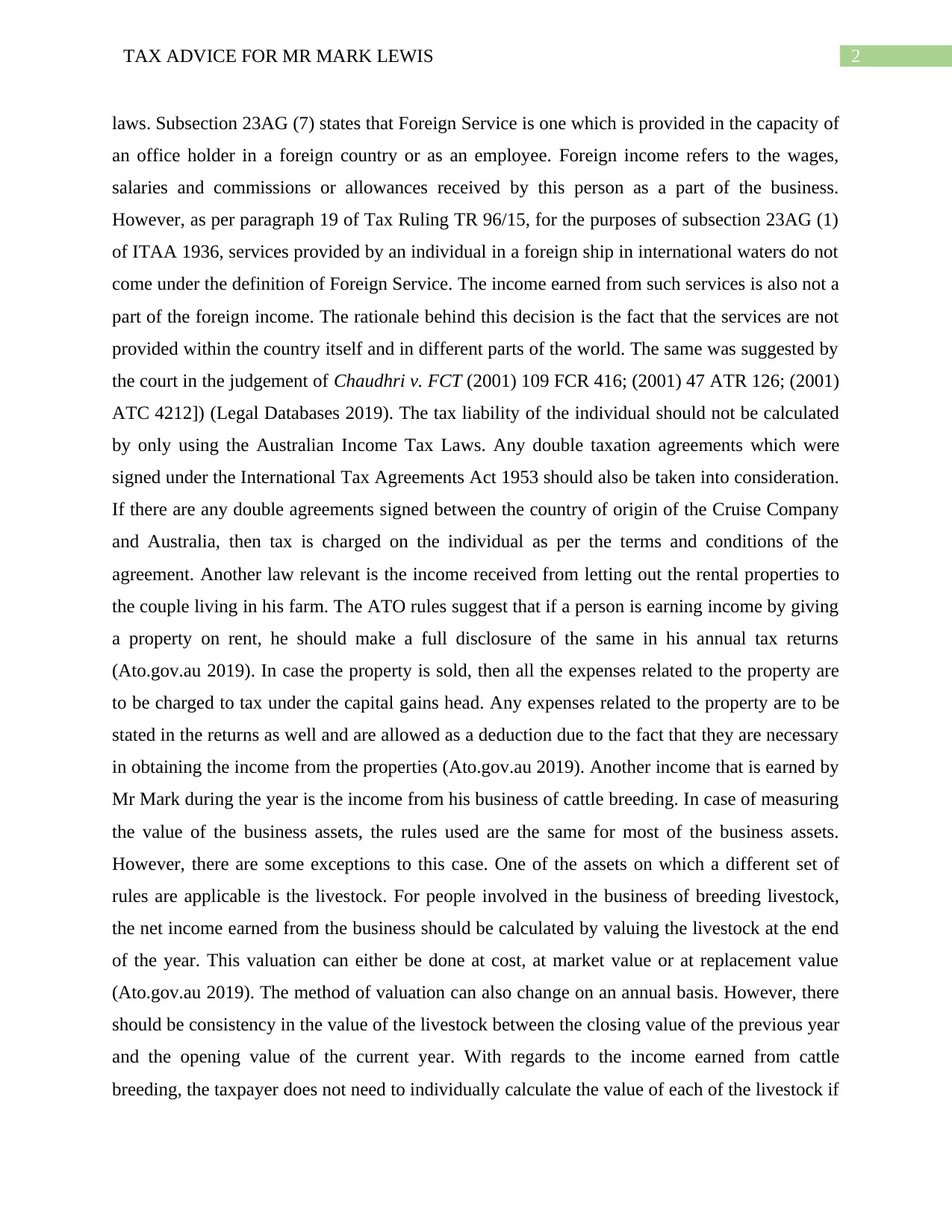
2TAX ADVICE FOR MR MARK LEWIS
laws. Subsection 23AG (7) states that Foreign Service is one which is provided in the capacity of
an office holder in a foreign country or as an employee. Foreign income refers to the wages,
salaries and commissions or allowances received by this person as a part of the business.
However, as per paragraph 19 of Tax Ruling TR 96/15, for the purposes of subsection 23AG (1)
of ITAA 1936, services provided by an individual in a foreign ship in international waters do not
come under the definition of Foreign Service. The income earned from such services is also not a
part of the foreign income. The rationale behind this decision is the fact that the services are not
provided within the country itself and in different parts of the world. The same was suggested by
the court in the judgement of Chaudhri v. FCT (2001) 109 FCR 416; (2001) 47 ATR 126; (2001)
ATC 4212]) (Legal Databases 2019). The tax liability of the individual should not be calculated
by only using the Australian Income Tax Laws. Any double taxation agreements which were
signed under the International Tax Agreements Act 1953 should also be taken into consideration.
If there are any double agreements signed between the country of origin of the Cruise Company
and Australia, then tax is charged on the individual as per the terms and conditions of the
agreement. Another law relevant is the income received from letting out the rental properties to
the couple living in his farm. The ATO rules suggest that if a person is earning income by giving
a property on rent, he should make a full disclosure of the same in his annual tax returns
(Ato.gov.au 2019). In case the property is sold, then all the expenses related to the property are
to be charged to tax under the capital gains head. Any expenses related to the property are to be
stated in the returns as well and are allowed as a deduction due to the fact that they are necessary
in obtaining the income from the properties (Ato.gov.au 2019). Another income that is earned by
Mr Mark during the year is the income from his business of cattle breeding. In case of measuring
the value of the business assets, the rules used are the same for most of the business assets.
However, there are some exceptions to this case. One of the assets on which a different set of
rules are applicable is the livestock. For people involved in the business of breeding livestock,
the net income earned from the business should be calculated by valuing the livestock at the end
of the year. This valuation can either be done at cost, at market value or at replacement value
(Ato.gov.au 2019). The method of valuation can also change on an annual basis. However, there
should be consistency in the value of the livestock between the closing value of the previous year
and the opening value of the current year. With regards to the income earned from cattle
breeding, the taxpayer does not need to individually calculate the value of each of the livestock if
laws. Subsection 23AG (7) states that Foreign Service is one which is provided in the capacity of
an office holder in a foreign country or as an employee. Foreign income refers to the wages,
salaries and commissions or allowances received by this person as a part of the business.
However, as per paragraph 19 of Tax Ruling TR 96/15, for the purposes of subsection 23AG (1)
of ITAA 1936, services provided by an individual in a foreign ship in international waters do not
come under the definition of Foreign Service. The income earned from such services is also not a
part of the foreign income. The rationale behind this decision is the fact that the services are not
provided within the country itself and in different parts of the world. The same was suggested by
the court in the judgement of Chaudhri v. FCT (2001) 109 FCR 416; (2001) 47 ATR 126; (2001)
ATC 4212]) (Legal Databases 2019). The tax liability of the individual should not be calculated
by only using the Australian Income Tax Laws. Any double taxation agreements which were
signed under the International Tax Agreements Act 1953 should also be taken into consideration.
If there are any double agreements signed between the country of origin of the Cruise Company
and Australia, then tax is charged on the individual as per the terms and conditions of the
agreement. Another law relevant is the income received from letting out the rental properties to
the couple living in his farm. The ATO rules suggest that if a person is earning income by giving
a property on rent, he should make a full disclosure of the same in his annual tax returns
(Ato.gov.au 2019). In case the property is sold, then all the expenses related to the property are
to be charged to tax under the capital gains head. Any expenses related to the property are to be
stated in the returns as well and are allowed as a deduction due to the fact that they are necessary
in obtaining the income from the properties (Ato.gov.au 2019). Another income that is earned by
Mr Mark during the year is the income from his business of cattle breeding. In case of measuring
the value of the business assets, the rules used are the same for most of the business assets.
However, there are some exceptions to this case. One of the assets on which a different set of
rules are applicable is the livestock. For people involved in the business of breeding livestock,
the net income earned from the business should be calculated by valuing the livestock at the end
of the year. This valuation can either be done at cost, at market value or at replacement value
(Ato.gov.au 2019). The method of valuation can also change on an annual basis. However, there
should be consistency in the value of the livestock between the closing value of the previous year
and the opening value of the current year. With regards to the income earned from cattle
breeding, the taxpayer does not need to individually calculate the value of each of the livestock if
⊘ This is a preview!⊘
Do you want full access?
Subscribe today to unlock all pages.

Trusted by 1+ million students worldwide
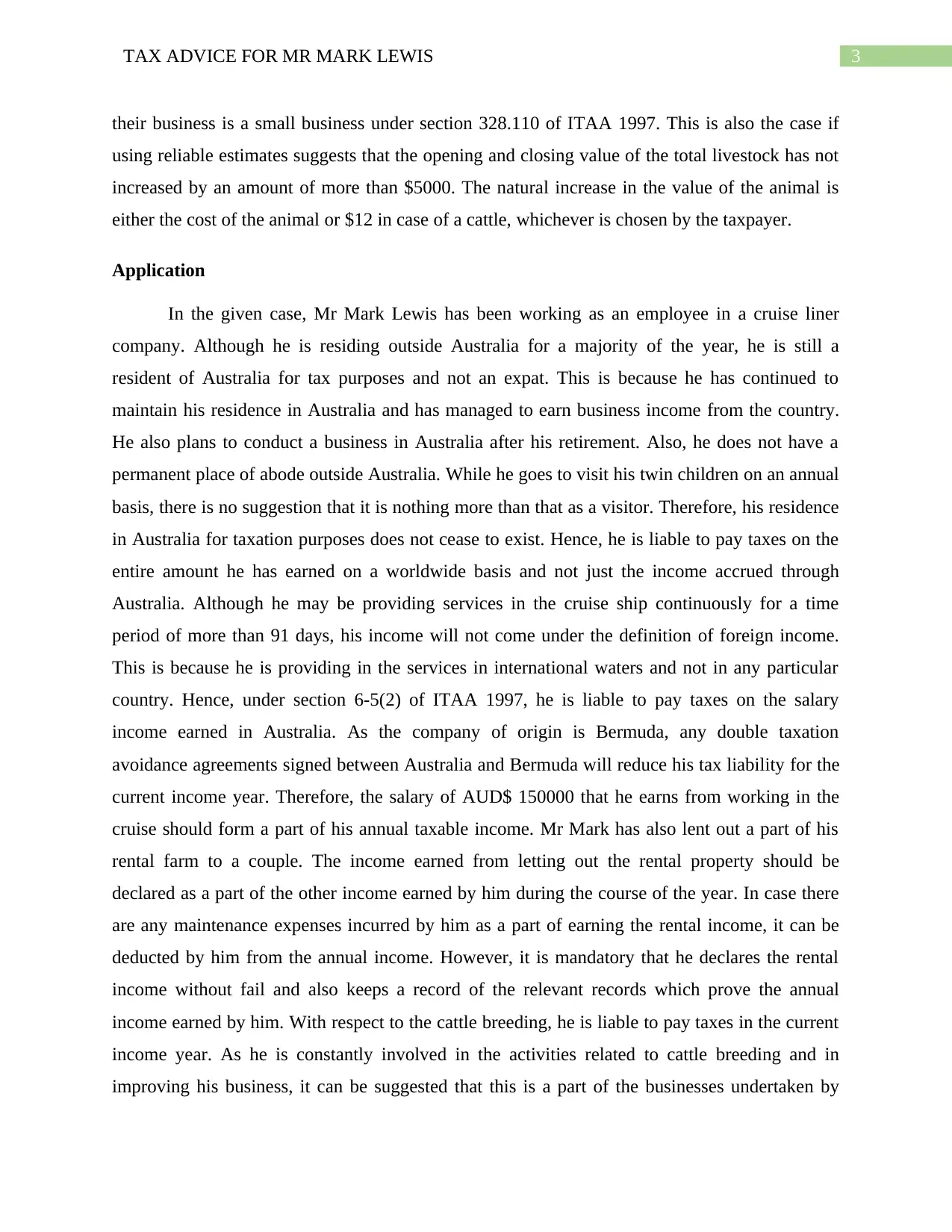
3TAX ADVICE FOR MR MARK LEWIS
their business is a small business under section 328.110 of ITAA 1997. This is also the case if
using reliable estimates suggests that the opening and closing value of the total livestock has not
increased by an amount of more than $5000. The natural increase in the value of the animal is
either the cost of the animal or $12 in case of a cattle, whichever is chosen by the taxpayer.
Application
In the given case, Mr Mark Lewis has been working as an employee in a cruise liner
company. Although he is residing outside Australia for a majority of the year, he is still a
resident of Australia for tax purposes and not an expat. This is because he has continued to
maintain his residence in Australia and has managed to earn business income from the country.
He also plans to conduct a business in Australia after his retirement. Also, he does not have a
permanent place of abode outside Australia. While he goes to visit his twin children on an annual
basis, there is no suggestion that it is nothing more than that as a visitor. Therefore, his residence
in Australia for taxation purposes does not cease to exist. Hence, he is liable to pay taxes on the
entire amount he has earned on a worldwide basis and not just the income accrued through
Australia. Although he may be providing services in the cruise ship continuously for a time
period of more than 91 days, his income will not come under the definition of foreign income.
This is because he is providing in the services in international waters and not in any particular
country. Hence, under section 6-5(2) of ITAA 1997, he is liable to pay taxes on the salary
income earned in Australia. As the company of origin is Bermuda, any double taxation
avoidance agreements signed between Australia and Bermuda will reduce his tax liability for the
current income year. Therefore, the salary of AUD$ 150000 that he earns from working in the
cruise should form a part of his annual taxable income. Mr Mark has also lent out a part of his
rental farm to a couple. The income earned from letting out the rental property should be
declared as a part of the other income earned by him during the course of the year. In case there
are any maintenance expenses incurred by him as a part of earning the rental income, it can be
deducted by him from the annual income. However, it is mandatory that he declares the rental
income without fail and also keeps a record of the relevant records which prove the annual
income earned by him. With respect to the cattle breeding, he is liable to pay taxes in the current
income year. As he is constantly involved in the activities related to cattle breeding and in
improving his business, it can be suggested that this is a part of the businesses undertaken by
their business is a small business under section 328.110 of ITAA 1997. This is also the case if
using reliable estimates suggests that the opening and closing value of the total livestock has not
increased by an amount of more than $5000. The natural increase in the value of the animal is
either the cost of the animal or $12 in case of a cattle, whichever is chosen by the taxpayer.
Application
In the given case, Mr Mark Lewis has been working as an employee in a cruise liner
company. Although he is residing outside Australia for a majority of the year, he is still a
resident of Australia for tax purposes and not an expat. This is because he has continued to
maintain his residence in Australia and has managed to earn business income from the country.
He also plans to conduct a business in Australia after his retirement. Also, he does not have a
permanent place of abode outside Australia. While he goes to visit his twin children on an annual
basis, there is no suggestion that it is nothing more than that as a visitor. Therefore, his residence
in Australia for taxation purposes does not cease to exist. Hence, he is liable to pay taxes on the
entire amount he has earned on a worldwide basis and not just the income accrued through
Australia. Although he may be providing services in the cruise ship continuously for a time
period of more than 91 days, his income will not come under the definition of foreign income.
This is because he is providing in the services in international waters and not in any particular
country. Hence, under section 6-5(2) of ITAA 1997, he is liable to pay taxes on the salary
income earned in Australia. As the company of origin is Bermuda, any double taxation
avoidance agreements signed between Australia and Bermuda will reduce his tax liability for the
current income year. Therefore, the salary of AUD$ 150000 that he earns from working in the
cruise should form a part of his annual taxable income. Mr Mark has also lent out a part of his
rental farm to a couple. The income earned from letting out the rental property should be
declared as a part of the other income earned by him during the course of the year. In case there
are any maintenance expenses incurred by him as a part of earning the rental income, it can be
deducted by him from the annual income. However, it is mandatory that he declares the rental
income without fail and also keeps a record of the relevant records which prove the annual
income earned by him. With respect to the cattle breeding, he is liable to pay taxes in the current
income year. As he is constantly involved in the activities related to cattle breeding and in
improving his business, it can be suggested that this is a part of the businesses undertaken by
Paraphrase This Document
Need a fresh take? Get an instant paraphrase of this document with our AI Paraphraser
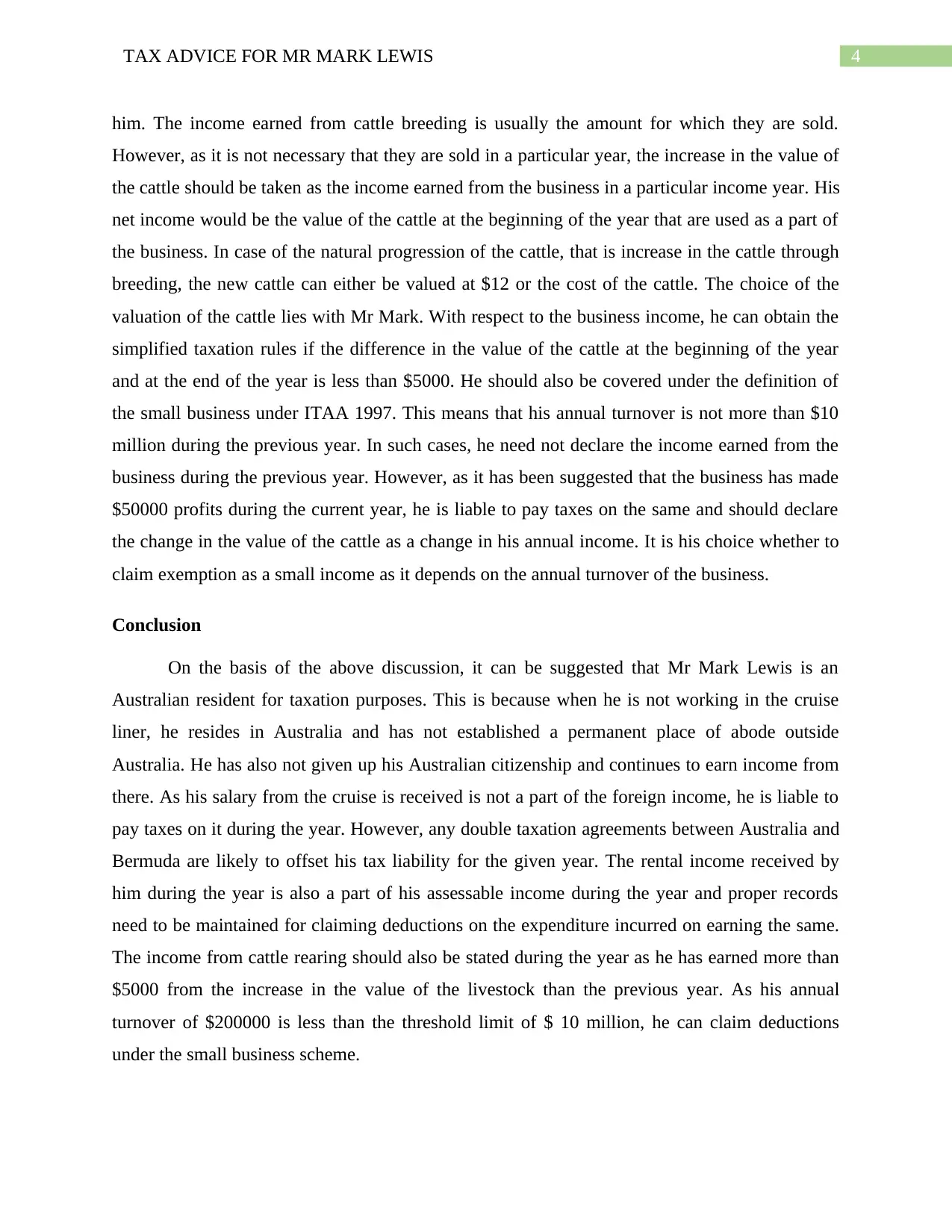
4TAX ADVICE FOR MR MARK LEWIS
him. The income earned from cattle breeding is usually the amount for which they are sold.
However, as it is not necessary that they are sold in a particular year, the increase in the value of
the cattle should be taken as the income earned from the business in a particular income year. His
net income would be the value of the cattle at the beginning of the year that are used as a part of
the business. In case of the natural progression of the cattle, that is increase in the cattle through
breeding, the new cattle can either be valued at $12 or the cost of the cattle. The choice of the
valuation of the cattle lies with Mr Mark. With respect to the business income, he can obtain the
simplified taxation rules if the difference in the value of the cattle at the beginning of the year
and at the end of the year is less than $5000. He should also be covered under the definition of
the small business under ITAA 1997. This means that his annual turnover is not more than $10
million during the previous year. In such cases, he need not declare the income earned from the
business during the previous year. However, as it has been suggested that the business has made
$50000 profits during the current year, he is liable to pay taxes on the same and should declare
the change in the value of the cattle as a change in his annual income. It is his choice whether to
claim exemption as a small income as it depends on the annual turnover of the business.
Conclusion
On the basis of the above discussion, it can be suggested that Mr Mark Lewis is an
Australian resident for taxation purposes. This is because when he is not working in the cruise
liner, he resides in Australia and has not established a permanent place of abode outside
Australia. He has also not given up his Australian citizenship and continues to earn income from
there. As his salary from the cruise is received is not a part of the foreign income, he is liable to
pay taxes on it during the year. However, any double taxation agreements between Australia and
Bermuda are likely to offset his tax liability for the given year. The rental income received by
him during the year is also a part of his assessable income during the year and proper records
need to be maintained for claiming deductions on the expenditure incurred on earning the same.
The income from cattle rearing should also be stated during the year as he has earned more than
$5000 from the increase in the value of the livestock than the previous year. As his annual
turnover of $200000 is less than the threshold limit of $ 10 million, he can claim deductions
under the small business scheme.
him. The income earned from cattle breeding is usually the amount for which they are sold.
However, as it is not necessary that they are sold in a particular year, the increase in the value of
the cattle should be taken as the income earned from the business in a particular income year. His
net income would be the value of the cattle at the beginning of the year that are used as a part of
the business. In case of the natural progression of the cattle, that is increase in the cattle through
breeding, the new cattle can either be valued at $12 or the cost of the cattle. The choice of the
valuation of the cattle lies with Mr Mark. With respect to the business income, he can obtain the
simplified taxation rules if the difference in the value of the cattle at the beginning of the year
and at the end of the year is less than $5000. He should also be covered under the definition of
the small business under ITAA 1997. This means that his annual turnover is not more than $10
million during the previous year. In such cases, he need not declare the income earned from the
business during the previous year. However, as it has been suggested that the business has made
$50000 profits during the current year, he is liable to pay taxes on the same and should declare
the change in the value of the cattle as a change in his annual income. It is his choice whether to
claim exemption as a small income as it depends on the annual turnover of the business.
Conclusion
On the basis of the above discussion, it can be suggested that Mr Mark Lewis is an
Australian resident for taxation purposes. This is because when he is not working in the cruise
liner, he resides in Australia and has not established a permanent place of abode outside
Australia. He has also not given up his Australian citizenship and continues to earn income from
there. As his salary from the cruise is received is not a part of the foreign income, he is liable to
pay taxes on it during the year. However, any double taxation agreements between Australia and
Bermuda are likely to offset his tax liability for the given year. The rental income received by
him during the year is also a part of his assessable income during the year and proper records
need to be maintained for claiming deductions on the expenditure incurred on earning the same.
The income from cattle rearing should also be stated during the year as he has earned more than
$5000 from the increase in the value of the livestock than the previous year. As his annual
turnover of $200000 is less than the threshold limit of $ 10 million, he can claim deductions
under the small business scheme.

5TAX ADVICE FOR MR MARK LEWIS
⊘ This is a preview!⊘
Do you want full access?
Subscribe today to unlock all pages.

Trusted by 1+ million students worldwide
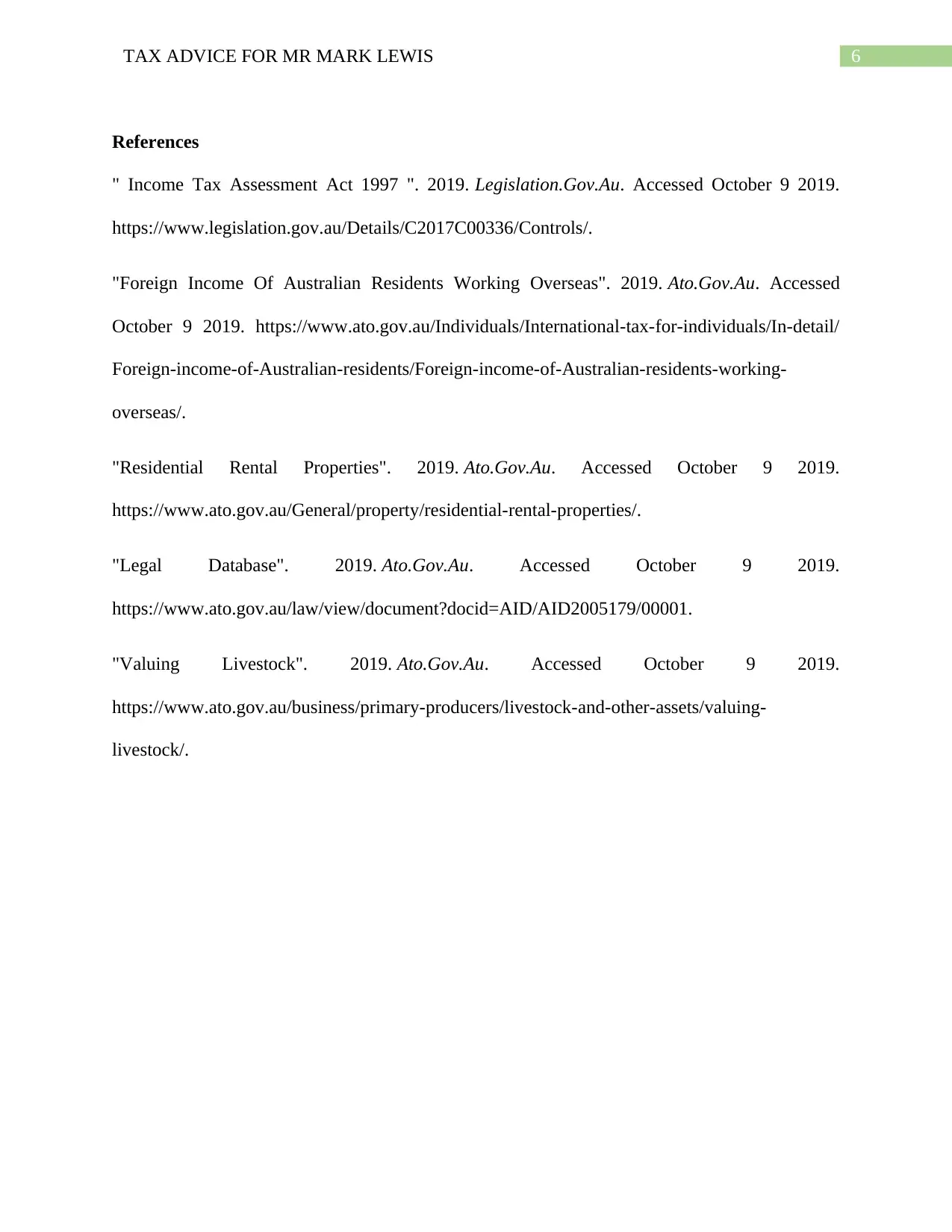
6TAX ADVICE FOR MR MARK LEWIS
References
" Income Tax Assessment Act 1997 ". 2019. Legislation.Gov.Au. Accessed October 9 2019.
https://www.legislation.gov.au/Details/C2017C00336/Controls/.
"Foreign Income Of Australian Residents Working Overseas". 2019. Ato.Gov.Au. Accessed
October 9 2019. https://www.ato.gov.au/Individuals/International-tax-for-individuals/In-detail/
Foreign-income-of-Australian-residents/Foreign-income-of-Australian-residents-working-
overseas/.
"Residential Rental Properties". 2019. Ato.Gov.Au. Accessed October 9 2019.
https://www.ato.gov.au/General/property/residential-rental-properties/.
"Legal Database". 2019. Ato.Gov.Au. Accessed October 9 2019.
https://www.ato.gov.au/law/view/document?docid=AID/AID2005179/00001.
"Valuing Livestock". 2019. Ato.Gov.Au. Accessed October 9 2019.
https://www.ato.gov.au/business/primary-producers/livestock-and-other-assets/valuing-
livestock/.
References
" Income Tax Assessment Act 1997 ". 2019. Legislation.Gov.Au. Accessed October 9 2019.
https://www.legislation.gov.au/Details/C2017C00336/Controls/.
"Foreign Income Of Australian Residents Working Overseas". 2019. Ato.Gov.Au. Accessed
October 9 2019. https://www.ato.gov.au/Individuals/International-tax-for-individuals/In-detail/
Foreign-income-of-Australian-residents/Foreign-income-of-Australian-residents-working-
overseas/.
"Residential Rental Properties". 2019. Ato.Gov.Au. Accessed October 9 2019.
https://www.ato.gov.au/General/property/residential-rental-properties/.
"Legal Database". 2019. Ato.Gov.Au. Accessed October 9 2019.
https://www.ato.gov.au/law/view/document?docid=AID/AID2005179/00001.
"Valuing Livestock". 2019. Ato.Gov.Au. Accessed October 9 2019.
https://www.ato.gov.au/business/primary-producers/livestock-and-other-assets/valuing-
livestock/.
1 out of 7
Your All-in-One AI-Powered Toolkit for Academic Success.
+13062052269
info@desklib.com
Available 24*7 on WhatsApp / Email
![[object Object]](/_next/static/media/star-bottom.7253800d.svg)
Unlock your academic potential
Copyright © 2020–2026 A2Z Services. All Rights Reserved. Developed and managed by ZUCOL.

